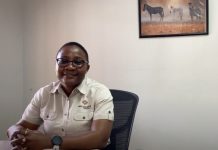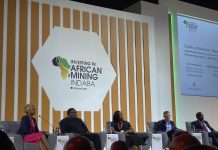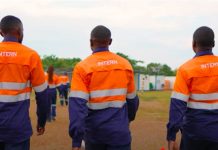Global players from mining sectors around the world gathered at the ‘Investing in African Mining Indaba’ from 3-6 February at Cape Town International Convention Centre (CTICC) to discuss the latest trends in mining, to network and, above all, to identify business opportunities. This is the world’s largest mining investment conference and, with the spotlight on Africa, it is no surprise that forty African countries sent delegations to the event, which offers governments a very targeted platform to promote their mining industries to investors, suppliers, and other key stakeholders.
The extent to which the mining industry is capital intensive cannot be understated; large mines cost billions of dollars to establish, and hundreds of millions more to sustain over their lifespan. Ten African nations took the opportunity to make a case for why their countries should be the target for global finance during Country Case Study sessions, framed as “a rare opportunity to dive deeper with key stakeholders into jurisdictions [one] may be considering investing in or developing projects in.”
Zambia’s Minister of Mines, Hon. Richard Musukwa, was one of 38 ministers to attend the highly-regarded event, along with the Prime Minister of the Democratic Republic of Congo (DRC), the President of Sierra Leone, two country’s premiers, three state secretaries, and ten ambassadors. Two of Zambia’s neighbours, the Democratic Republic of Congo (DRC) and Angola, were among those that made country presentations to highlight policies and development projects that are likely to position them favourably on the continental mining map. But, unlike in previous years when Zambia took the opportunity with relish, the Government opted to do nothing this year.
At a time when the country’s copper production is slumping on the back of extreme policy changes, and the mining industry is in dire need of capital to sustain operations and avoid job losses, one has to question why the opportunity to engage investors was missed.
Unlike in previous years when Zambia took the opportunity with relish to make a country presentation, the Government opted to do nothing this year.
Minister Musukwa did join Zimbabwe’s Minister of Mines & Mining Development, and Botswana’s Minister for Mineral Resources, Green Technology & Energy Security on a stage shared by the ‘Southern Africa bloc’, to provide a brief “snapshot” of the country’s mining sector, for a small audience. Botswana’s Lefoko Moagi outlined several details about his country’s taxation rates, customs duties, along with other “investment incentives” and, as such, his presentation was a tough act to follow. Sadly, Minister Musukwa’s presentation did not draw attention to the country’s advantages, nor did it provide specifics regarding what makes our fiscal regime “predictable and stable”, or why our taxation system is, in his words, “competitive”.

This would have been an opportune moment to showcase Zambia’s strengths — both for the sake of informing investment houses’ decisions regarding their allocation of capital to the mining industry, and for the sake of nurturing future partnerships that we may wish to secure. Zambia is not a country that generates its own surplus; we need external capital to advance our national aims and interests. Earlier this month, Government made an open plea for K300 million in order to fund the country’s 2020 Population Census, the importance of which the Ministry of Finance outlined with the requisite detail. One might assume that, when seeking to encourage investment in the country’s mining industry, devising investor-specific messaging for this conference’s captive audience would be well-advised.
Instead, we allowed a domestic dispute to enter public discourse or, as some have described it, we aired our dirty laundry in public. The ongoing dispute with Vedanta — the majority shareholder of Konkola Copper Mines (KCM) — is already being adjudicated via legal and arbitration proceedings. Vociferously repeating the same disputed accusations at the Mining Indaba was surely not in Zambia’s best interests, yet this was the one takeaway that the Financial Times reported to its readership of investors, and the only mention of Zambia’s presence at the event in the international press.
Creating favourable impressions was, indeed, the goal of many delegates. Mining companies and governments alike highlighted particular achievements, especially as they related to ESG, which emerged as a central theme during the four-day event. ESG is the acronym that refers to Environmental, Social and Governance issues, which is increasingly becoming part of conversations within the mining industry. According to several panellists at this year’s Indaba, investors have ever-increasing expectations that mining companies behave in a socially and environmentally responsible manner, with due attention to “governance” issues (such as its leadership, shareholder rights, and audits). This can only be a good thing for mining countries like Zambia.
Instead, we allowed a domestic dispute to enter public discourse or, as some have described it, we aired our dirty laundry in public
In previous years, the Zambian delegation has been well-prepared for the annual Mining Indaba, with interactions in Cape Town between government representatives and company executives, to communicate a coherent message that sought to further Zambia’s interests. Somewhat ironically, at this year’s event, inter-ministerial cooperation was a prominent topic, with several governments, civil society organisations and corporates all espousing the benefits of government departments working together towards a common goal that is in the national interest. If there is one thing that we can hope to take away from this unexpectedly eventful Mining Indaba, it might be the importance of a cohesive and coordinated message, tailored to the audience with which we wish to do business, in order to further Zambia’s economic and developmental goals. In doing so, perhaps next year Zambia will make it onto the Mining Indaba radar for all the right reasons.
See also: Has-been or here to stay: Can Zambia re-establish itself on the global copper map?
























Je suis Vraiment Très Ému, Pour votre Organisation et Engagement au Service de Soutien Pour Nous, Africains.
Je Souhaiterais Avoir Une ferveur au Sein de Votre Entreprise, Pour le Soutien de la Réalisation de mes Projets qui me Tiennent à Cœur ❤️…